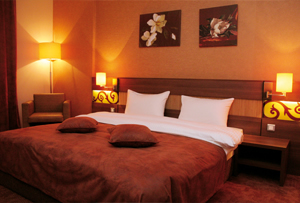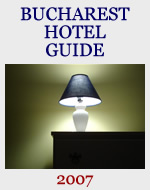Grand ambitions
Romania’s hotel market is witnessing a massive growth in its two to four star market, as domestic and international chains fight over business tourism
 |
|
|||||||||||||
Bucharest is aiming to make hospitality history with the opening of the enormous 1,500-room Rin Grand Hotel in the Vitan- Barzesti area, which looms over the south capital’s post-industrial landscape like a pink Titanic.
Many of the hotel competition have been stunned by the confidence of the owners, the Negoita brothers of the Romanian Pro-Confort Group. The siblings believe the Capital has a capacity for one of the largest hotels in Europe, in a structure that is more suited to Moscow, Dubai or Beijing rather than Bucharest.
“It is either a huge folly or the smartest business decision anyone has ever made in Romanian hoteliering,” says one senior hotel manager.
Now around 900 rooms are available and a further 600, along with a conference room and casino, aim to open this month. The hotel targets businesspeople and has doubled the availability of four-star hotel rooms in the city overnight. “This hotel covers 20 per cent of the accommodation capacity for Bucharest,” argues Ionut Negoita, general manager of the Pro Confort Group.
But building this behemoth has still not satisfied the appetite of Ionut and his brother Robert. The two have bought a 7.5 hectare plot in Pipera, where they plan to build another mixed three and four star hotel. This will be twice the size of the Rin Grand Hotel.
'1') {
require('php/art_auth.inc');
}
?>
It will have 3,000 rooms.
“If the evolution of Rin Grand Hotel is positive, we will develop this hotel,” says Negoita.
But to keep a steady traffic that makes a profit the hotel will need 50 per cent occupancy all the year round, argue experts. This means filling 750 rooms every day. Only a height of 25 per cent occupancy has so far been registered during the weekdays. Negoita has a modest target of only 40 per cent during the week for 2007. He has also managed to build on one giant opportunity. “All 900 rooms have been booked for this April’s NATO summit,” he says.
But Antoni Kuhnen, president of Bucharest’s hotelier group, the Skal Club, believes the market is becoming “more fragile” for large scale hotels with a huge capacity. “Rin Grand Hotel will work at particular points in the year, such as for NATO,” says Kuhnen. “It will have a very good business in May, June and September.”
Other hoteliers argue that building big is not healthy for the market.
“Bucharest needs accommodation in all areas including medium and large hotels between 200 and 400 rooms, not concentrated in over-sized hotels,” says Paul Marasoiu, CEO of consultants Peacock Hotels and regional area manager for Golden Tulip Hotel Chain.
If the location is not accessible for customers, such as in the centre or near the airport, the managers will need to lower the prices for the rooms. “This creates an imbalance in the market,” argues Marasoiu. “If a customer can buy a room for a third of its regular price at some hotels, he or she will no longer be able to understand the quality standards and the rates offered by other serious hotels in the same category with a decent management.”
No imagination
Most new hotel developments in Bucharest are simply a big box with rooms. The city faces a shortfall of boutique hotels. Outside of the luxury market, there are few unique concepts in interesting locations where every room offers a different experience and the hotel becomes a destination in itself.
One exception is the three-star Rembrandt Hotel on Strada Smardan, established in a reconverted bank in Bucharest’s Historic Centre. The unique building has 16 rooms, 12 staff and boasts a 75 per cent occupancy rate. The owners are now planning a new 50-room hotel, also in the Historic Centre.
“Small is beautiful,” says manager Jerry van Schaik, who welcomes further competition opening up next door. “More smaller hotels offering personal service in the Historic Centre would create a cluster which would be good for Bucharest. This would give us greater negotiating power with the city authorities.”
Another property ripe for redevelopment is the two-star Triumf Hotel, currently owned by the state, on Soseaua Kiseleff, in one of the best locations in the city. One senior hotel manager says it is not possible to be a “high-class” hotel due to the small size of this hotel’s rooms.
But Antoni Kuhnen believes it could be a great option. “Architects can be creative,” he says. “They can keep the facade and change everything behind it.”
Tourist trap
About 80 per cent of Bucharest’s hotels revenues in 2007 were generated by business tourism, according to real estate agency Coldwell Banker. On average, hotels boast a 90 per cent occupancy rate during weekdays, which drops to 45 per cent at weekends.
Many leisure tours for foreigners exclude the capital of Romania from their itinerary. This is due to the city’s poor infrastructure, high accommodation prices and low capacities.
“In 2007 tourism picked up,” says van Schaik. “This was mostly from US and western Europe, but Bucharest was seen as a stopover for travel to Transylvania, the Danube Delta or the seaside.”
Visitors are still not coming to Bucharest for its own qualities. “We are working on a weekend package for foreign tourists, but for customers of quality,” says van Schaik. “We don’t want stag parties.”
The boom in low-cost airlines may also help bring more travellers to Bucharest. “Once the tourist market picks up, two and three star hotels will have greater success in weekend tourism,” says Kuhnen. “This was the pattern with capital destinations such as Prague and Budapest.”
Classification confusion
“Five star hotels are compulsory for businessmen, company presidents and decision makers,” argues Marasoiu. “They need to be associated with luxury hotels. It is an image issue.”
But some managers believe image is not an important deciding factor. “Businessmen are not looking for so much comfort when they travel, they just want a good clean room and a good Internet connection,” says Daniel Ben-Yehuda, general manager of Ramada Plaza and Best Western Park Hotels.
However one premium hotel manager tells The Diplomat that at least one large multinational has just ‘forbidden’ its staff from staying at five-star hotels. Fears of recession in the US may force large corporates to cut back on their unnecessary expenses – including posh hotels. This could be an opportunity for the four and three star market.
Although the difference between a four and a five-star room is determined by the room size and facilities, there may be little logic to the Romanian tourism authority’s system for assessing hotels. Abroad, Sofitel tends to be a five-star hotel – but in Romania has only four, while Howard Johnson Grand Plaza is a four-star hotel abroad, but in Bucharest boasts an extra star.
To gain a rating, each hotel has to fill in a form detailing the size of the rooms and the facilities on offer, which then add up to a series of ‘points’. A hotel with more points wins a larger number of stars. Inspectors from the Government tourism department then check up on the hotels to assess the accuracy of the points.
But the nature of the inspection is sometimes bizarre.
“One inspector came to see our hotel,” says a three-star hotel manager. “He walked into the room and said: ‘What’s this on the floor?’ I replied to him: ‘It’s wood. It’s a wooden floor.’ He said: ‘You can’t have wooden floors in a hotel.’ I replied ‘Why not?’ He said: ‘You just can’t.’”
Strangely, a three star hotel in Bucharest can easily pass for a five star in Cluj-Napoca. “The criteria of one to five stars are old fashioned and subject to communist interpretation,” says Kuhnen. “An in-depth classification system still needs to be adopted.”
There are four-star hotels in Romania which lack professional management teams who can understand and comply with the needs of four-star customers, argue experts. The expectations of international customers are rarely fulfilled.
“We are now in the process of building our image on the international hospitality market and we are making huge mistakes by accepting classifications based on owners’ egos rather than dictated by the hotel’s characteristics,” says Marasoiu. “The correct classification of a hotel can only be made by a demanding customer.”
The Diplomat tried to contact a Ministry official on the question of hotel classification but, by the time we went to press, no one was forthcoming.
Chain invasion
International and domestic two and three star chains are planning a blitz through Romania. Known brands such as Ibis and Etap and home-grown players such as Continental Hotels and Monte Nelly Inns are poised to fill the gap in quality affordable accommodation.
“We are targeting the two and three star market in cities outside Bucharest,” says Bruno Vinette, general manager of Sofitel Hotel, part of the Accor Group.
The group is looking for land plots to expand its two-star Etap brand and three-star Ibis in cities such as Brasov, Ploiesti (Prahova county), Timisoara, Cluj-Napoca, Arad and Constanta.
Most two and three-star hotels in Romania fail to meet international standards. They are mostly standalone buildings with a confusing ownership status. Many were built in the 1980s and are in need of refurbishment. Some are cash-cows for corrupt local politicians and few have a long-term strategy. Experts argue that a quality chain could clean up in major cities, providing it understands that business travel will remain the main growth driver.
This year Continental Hotels, which owns three four-star and six three-star hotels in Romania, will open a two-star hotel in Gara de Nord area. This will have smaller rooms than its existing hotels, but will include air conditioning, TV and Internet connection.
“The hotel addresses middle class tourists in transit through Bucharest, who need comfortable and cheaper accommodation,” Radu Enache, President and CEO of Continental Hotels tells The Diplomat. In the capital there is also a demand for this kind of accommodation. “Bucharest needs clean, decent rooms for people who do not have a high budget,” says Marasoiu.
If the Gara de Nord project works, the hotel group will launch ten similar two-star hotels in cities such as Arad, Cluj-Napoca and Iasi.
Report by Corina Ilie and
Michael Bird
Brand takeover
By 2012 the Bucharest hotel market will witness an almost doubling of the current room capacity, to 12,000 rooms, according to Peacock Hotels. Many real estate projects in Bucharest claim to be showcasing a mall, apartments and an ‘internationally-recognised four or five star hotel brand’, although few have any final deals signed. Sema Park Hotel plans to open in a real project on the Dambovita near Semnatoarea Metro, with 22 floors and 240 rooms, for a tentative date of Spring 2009. Swedish hotel chain Rezidor, which is opening a hotel in Poiana Brasov and is running the 424-room Radisson SAS on Calea Victoriei, is looking into cities such as Cluj-Napoca, Timisoara and Constanta to open hotels in the next ten years, general manager of Radisson SAS Torbjorn Bodin told The Diplomat.
Below are the some of the chains making waves in Romania.
Ramada
Ramada Plaza, located west of Baneasa, opposite the Best Western Parc Hotel, is opening this spring. Romanian company Trend Hospitality, the franchiser of Ramada, has invested 12 million Euro to revamp the 300-room Turist Hotel including a 150-seat restaurant. “The rooms are much bigger now and we have more facilities,” says the hotel’s general manager Daniel Ben Yehuda. Four-star Ramadas exist on Calea Victoriei and in the north of the capital on Str. Daniel Danielopolu.
Pro-Confort Group
Rin Grand Hotel, offering 1,500 rooms on Calea Vitan-Barzesti, is now open. The group has also bought a 7.5 plot in Pipera for a potential 3,000 room three and four-star hotel. In the Bucharest areas, Pro-Confort Group has two more three star hotels, Confort Otopeni and Confort Traian and the four-star Hotel Rin in Otopeni.
Golden Tulip
A four star Golden Tulip Paladium with 144 rooms will open this October in the north of Bucharest. In the west capital, the chain will open a 136-room three star Tulip Inn hotel. This chain has five three and four-star hotels in Bucharest and plans to expand to cities such as Constanta, Brasov, Sibiu, Cluj, Arad and Timisoara and to bring the four-star Golden Tulip Resort to Moeciu, Prahova county.
Africa Israel Hotels
Africa Israel Hotels has purchased four small hotels in central Bucharest, the four-star Opera and Venezia, the three-star Capitol and the four-star Palace, which plans to open in 2009. Sister company AFI Europe is planning to build a four star hotel inside its AFI Cotroceni Park complex in west Bucharest on Blvd Timisoara. The group is “considering to franchise” a brand from a big international chain, says Reuven Havar, the company’s CEO. In Israel, the hotel group has the franchise for the Holiday Inn. Most hoteliers believe it will be a matter of time before someone manages to bring this franchise to Romania.
Continental
Continental Hotels has budgeted investments of 135- 138 million Euro between 2007 and 2011 to expand its two to four star hotels in Romania. Following a management agreement closed with French chain Accor, Continental Hotels will manage the three-star Ibis brand in Romania. “We want to be present with all our two, three and four star brands in all cities with over 250,000 inhabitants,” says CEO Radu Enache. In Arad and Iasi the group will develop this year two similar complexes including a four-star brand Continental Forum, an Ibis Hotel and a two star hotel. In Cluj-Napoca the group has purchased a 4,200 sqm land plot to develop a complex including a four-star Continental Forum and an Ibis. This year Continental Hotels will open a two star hotel in Gara de Nord. If the public responds to this positively, the group could launch ten more two-star hotels with a total capacity of 1,000 to 1,200 rooms in cities such as Arad, Cluj and Iasi. Meanwhile Accor Group is looking for land plots to expand its two-star Etap brand to large Romanian cities.
Europa Group
Lithuanian Europa Group has bought a Timisoara-based two-floor barracks, the Cazarma Viena, for almost 11 million Euro in an open auction. The Baltic company plans to transform the residence, on Strada General Grigorescu, into a four-star hotel. In Bucharest Europa Group is reconverting a 19th Century building overlooking Piata Unirii, on Strada Franceza, into the Europa Royale Bucharest for delivery in Spring 2009.
Hotel Bulevard
The 19th century neoclassical Hotel Bulevard, at the corner of Calea Victoriei and Regina Elisabeta, is transforming into a four-star hotel by the Romanian-based Niro Group. The eight million Euro-project aimed to be finished by 2007, but is now delayed. Niro Group officials would not meet with The Diplomat to discuss the status of the development. The developer has stated that it intends to unite with an international hotel chain.
Monte Nelly Inns
General manager of the Monte Nelly Hotel, Bucharest, Antoni Kuhnen is planning to set up a three-star motel chain, the Monte Nelly Inns. These will be standard steel structures with modules of 15 rooms and a minimum of 30 rooms, set up in conjunction with Russian oil and gas group Lukoil. The first unit is planned to open in Vrancea county.

















